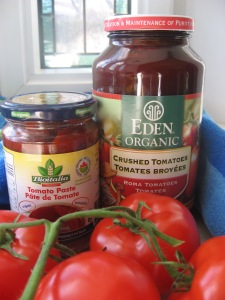2014 update: Add to the BPA free list: Jovial organic tomatoes, Hunt’s plain canned tomatoes (but not any of their other tomato products.)
Today you’re making tomato sauce. Good choice. Tomatoes are prized for their lycopene, the pigment that turns them red and is associated with anti-cancer activity.
Much of the research to date has focused on prostate cancer and lycopene’s ability to block the hormone androgen, but renowned cancer researcher Dr. Richard Beliveau suspects that tomatoes “might play a more general role in the prevention of other cancers” as well.
So what tomatoes should you choose for your sauce? Let’s talk in shades of black, white and grey.
Red or green tomatoes? Clearly red. That’s the lycopene showing its color. But not all reds are created equal—not even the plump ones ripening to perfection on your countertop. It all depends on when you pick them.
Field or vine? Generally neither. Vine are often grown hydroponically, resulting in fewer nutrients. Plus, both are usually picked when green, when lycopene is low, and then sprayed with a gas to ripen. To attain high lycopene levels, tomatoes need to ripen in the sun. Grow your own, or find a farmer you can trust.
Canned or jarred tomatoes? Better, but… Tomatoes that are too ripe when picked end up in cans and jars, meaning they’re much higher sources of lycopene. The cooking and crushing results in richer lycopene content, too. But remember the Bisphenol A problem we talked about in the canned beans post? BPA is the chemical used in the epoxy lining of cans and lids that Canada has declared a toxic substance. Without BPA in the lining, manufacturers say, the acidic tomatoes would eat right through the cans.
Time for shades of grey–Recently, the company Muir Glen (owned by General Mills) started making BPA free canned tomatoes, but supermarket shelves are in transition and won’t be fully clean until the end of 2012.
So are there other options? Long ago, Eden Foods began packaging their cooked tomatoes in glass jars. They’ve gotten a lot of kudos for it, but when pushed, admit there’s still some BPA in the lids. They promise, however, that the chemical doesn’t touch the food.
Tomatoes in Tetra Paks? Now you’re talking. Both Trader Joe’s and Pomi Tomatoes (from Italy) sell tomato products in BPA free plastic boxes. You can order Pomi through Amazon.
And tomato paste? Bingo! Tomato paste has up to three times as much lycopene as canned or jarred tomatoes, up to ten times as much as a fresh, raw red one. And there are manufacturers out there selling it (or at least claiming to sell it) in BPA free glass jars: Bioitalia and Bionaturae, also available on Amazon.
So the next time you’re making tomato sauce, add some paste and even some olive oil, and let it stew for a long while. The prolonged cooking, along with the oil, will enhance your body’s lycopene absorption–and hence your reputation as an anti cancer chef.


Reblogged this on Kmareka.com and commented:
Some good guidelines for anti-cancer cooking with tomatoes.
LikeLike
Pingback: Why tomatoes? « Monamifood's Blog
Pingback: Portobello Mushroom Burgers with Chipotle Mayonnaise – Heavenly! « Jittery Cook
Pingback: Tomato Basil Pine Nut Pasta- Happy St. Paddy’s Day! « jittery cook
Pingback: Health Food Love » » What canned foods are BPA free ?
Why does Hoxie Cancer Clinic recommend eliminating night shade plants (tomato)??
LikeLike
To answer that question, you’d have to ask the Hoxsey Clinic. I have been following nutrition and cancer in the medical literature for many years and have never read a study that ties the family of nightshade plants to cancer. Nightshades include potatoes, tomatoes, eggplant and peppers. Some people are allergic to them, and if you’re one of those people and you keep eating nightshades, then your body will keep mustering up its inflammatory response to fight the reaction. That’s chronic inflammation, an underlying condition that can feed the growth of cancer cells.
But the notion that nightshades cause inflammation in most people is “not supported by the evidence,” says Medical News Today. Read more here https://www.medicalnewstoday.com/articles/321745.php
As for potatoes, the big ones with lots of white starchy flesh will surely raise your blood sugar. Choose the small fingerlings with purple skin and yellow flesh for the most phytonutrients; if you cook, then refrigerate and eat them another day, either cold or re-warmed, their starches will re-organize and thus won’t raise your sugars as much.
LikeLike